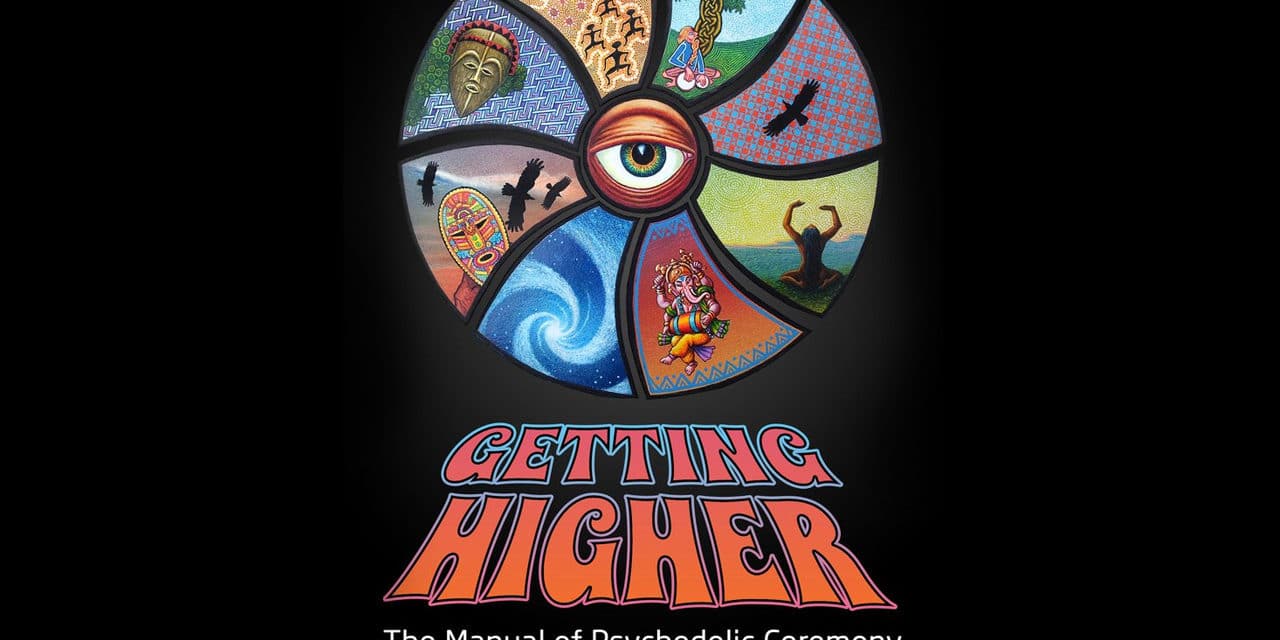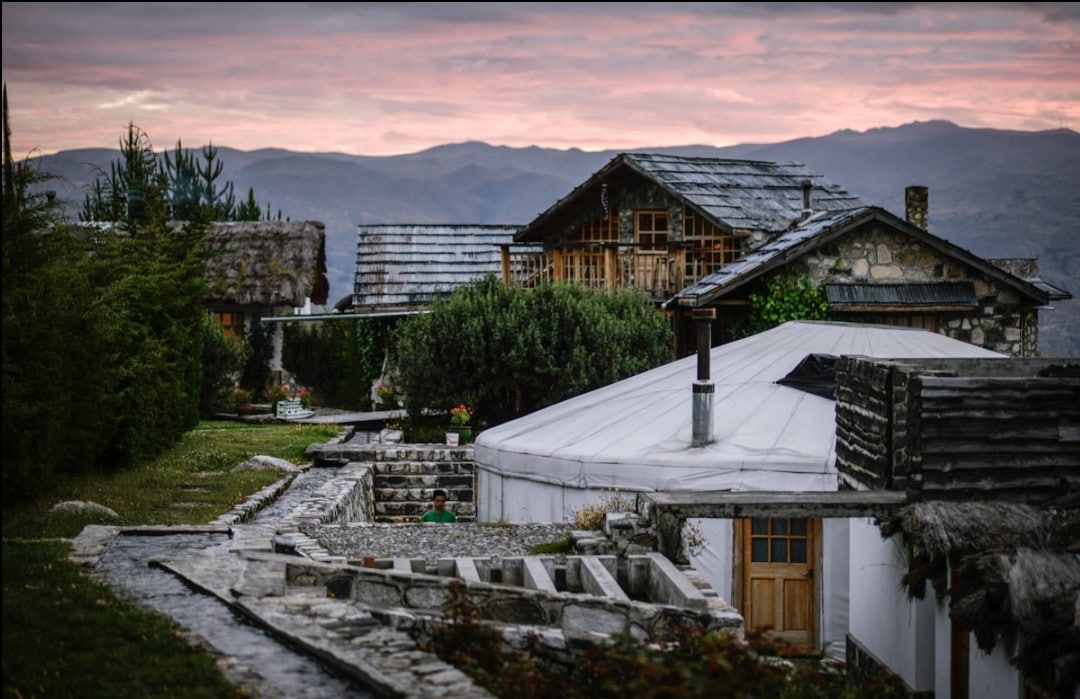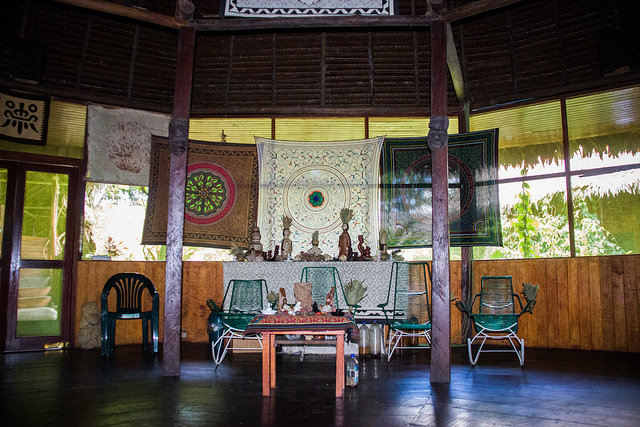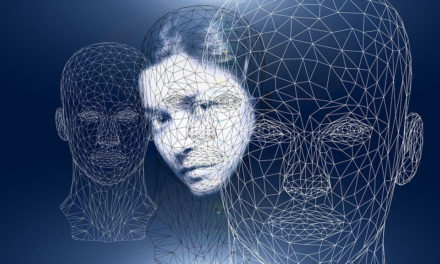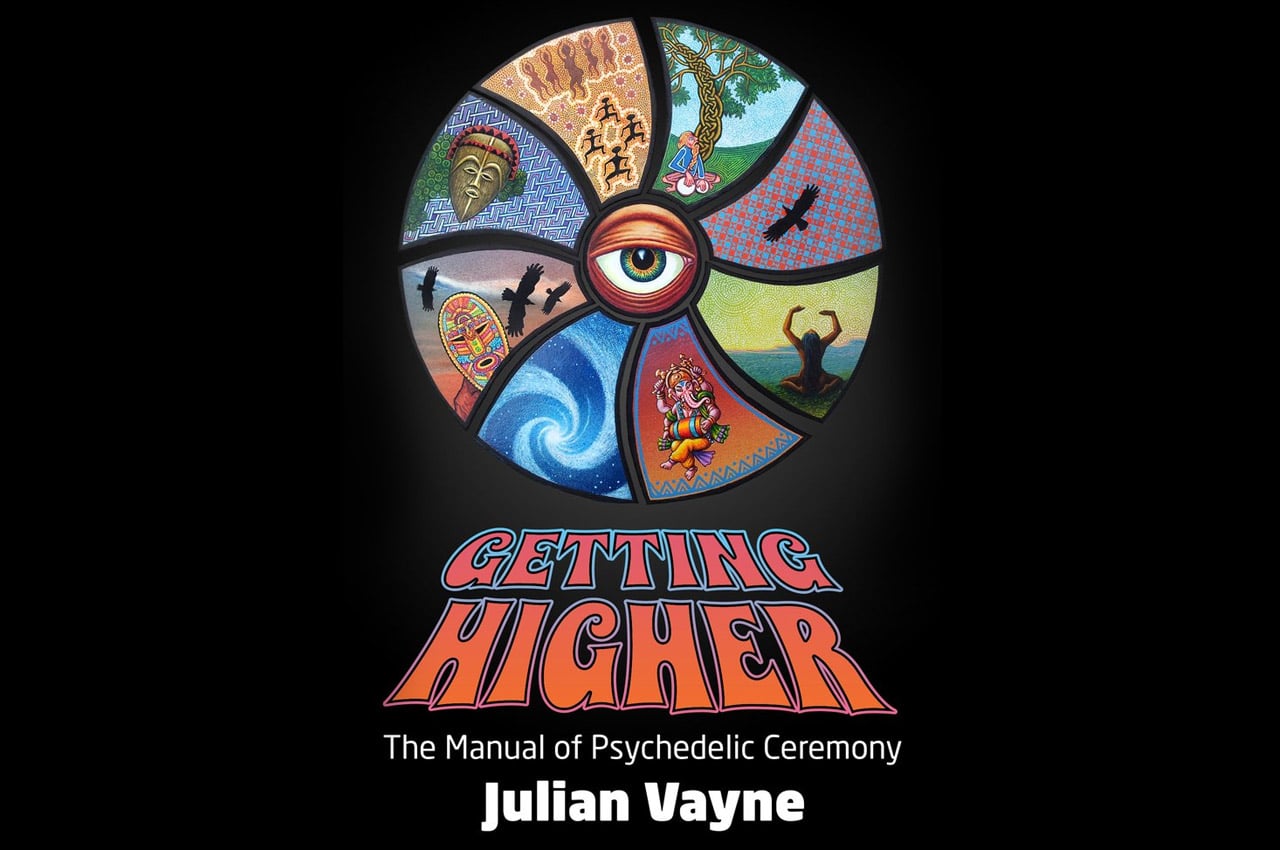
As new traditions of psychedelic use emerge and ancient traditions of entheogenic use gain recognition and evolve, the exact definition of “tradition” in a psychedelic context is hard to pin down. For some, tribal entheogenic traditions should be revered to the point of condemning any non-traditional use of a native psychedelic plant, while for others, access to the world’s pharmacopoeia of psychedelic medicines is making possible entire new ways to explore inner realms, create new ecstatic traditions, and heal emotional blockages and traumas.
Julian Vayne is the author of Getting Higher: The Manual of Psychedelic Ceremony, and as a chaos magician and quick-witted bard, his take on psychedelic ceremony blends both irreverence and deep reverence. After reading Getting Higher, I had the chance to speak to Julian at length about his take on ritual, ceremony, and tradition, and play devil’s advocate to the pretext of his book, which is all about making your own psychedelic ceremonies for fun, social bonding, adventure, and more. I found Julian’s points to be salient, wise, and rooted in a meta-view of human history that is hard to deny. For anyone who wishes to dive deeper into best practices for DIY psychedelic ceremony, I would highly recommend Getting Higher, which is a short and very enjoyable read.
Thanks so much for speaking with us, Julian. I’d like to discuss this aspect of ‘making up our own ceremonies,’ which is what your book is mostly about. Some people might say that such a thing is dangerous for various reasons. It could even be argued that it’s imperialist and appropriative. I’m curious what your take is on those concerns.
Firstly, I would say that human beings are ritualizing creatures. We use the imaginal realm and we use symbols, whether it is as simple as toasting before we drink alcohol, or as complicated as a Native American star medicine ceremony. All of us instinctively create rituals that run much of our lives; this is a universal human trait. So we cannot not do rituals. A ritual is a means of bringing special attention to something, and when we Westerners use psychedelics we may want to ritualize it in some way. Many people instinctively do this. So I’m advocating for the idea that we approach some of our psychedelic experience in this way and enhance it by using ritual technology.
Now if I look at my own story, I come from the British Isles and have no tradition of entheogenic psychedelic ritual culture that I can either recover from history or see clearly in our archaeology. There are tiny hints of things like the witchcraft and the alchemical material and so on, but overall I’m left impoverished. Now, I also have to acknowledge that I am the descendant of people who were within a power structure, and to some extent a power structure that certainly still exists, one that has been predatory on many of the cultures who still have these entheogenic traditions. And so when I go to those cultures or I sit with those people or read about them- however I engage with that story- I need to be polite, respectful, and thoughtful about this narrative. That’s just the way it is.
So I don’t deny my own right to make ritual, because that’s my right as a human being. I recognize the fact that I have to be creative, because I don’t have a tradition. And I recognize the fact that the people who are informing much of my practice, at least initially, are cultures that the empire in which I currently still live really fucked over. So that’s the situation I’m in, and I just have to be respectful and thoughtful, just like I would when meeting people or interacting on the internet or whatever. But in terms of the processes that I can observe within those rituals, I can observe things like various forms of creating space, various forms of having visual focus, having music or dance or whatever- those are human processes. It’s very easy for me to be inspired by those, and be inspired to create my own thing autonomously or with a peer group that I’m working with to enhance my relationship with the medicine. I’d like to think this is what those cultures would want me to be doing, because that sets me and my culture on a healing journey, whereby the cultural appropriation of the past can be mitigated and perhaps even forgiven, and we can go and do something fantastic together as one people.
That’s beautiful; I couldn’t agree more. It reminds me of my studies under a Native American elder a few years ago. Many people in his tradition are very closed-off to outsiders, and they have pretty good reasons to be. But he was sort of radical in the sense that he was opening up to lots of non-indigenous people like myself. One of the things that he said is that even as he was teaching us about prayer flags and medicine wheels and making offerings and asking permission and things like that, he told us that ultimately it does not matter what we do on the outside, it’s where we are within our hearts. That the ceremony could be anything.
That’s exactly it. A ceremony, for me, is an attempt to strive for authentic attention in the moment. I generally describe my style as either chaos magic or quasi-shamanic, because I’m not particularly interested in complicated ritual language or quasi-masonic ritual structures, although I’ve used those in the past. For me, it’s about having this authentic attention in the moment, and very often the behaviors or actions just kind of well up. You create a frame for your ritual, however you imagine it to be, and you strive to be genuine. You’re not trying to do this for the benefit of anyone or anything else, unless that is your intention. There’s no audience looking at you for this; its just about being authentic, and that’s what it’s for.
Beautiful, I think that’s very well put. Where some could argue that creating your own traditions can be dangerous or disrespectful, I think the stronger argument is that this is actually the most ancient perennial tradition, and as you said a basic human right, or even a basic human characteristic.
In all traditions, I’d argue there’s a degree of, if not racism, then at least unthinking behavior, in assuming that there’s such a thing as a “native tradition.” Take the story of ayahuasca and ayahuasca tourism, for example. The story of ayahuasca has hugely changed in the last 100 years in the landscapes of Brazil and Peru and so on. The traditions are a continuously reemerging thing. It’s continuously being remade by people, and it’s always argued that it’s conservative, but if you look at it, it’s like a mutating process. Human beings have always blended ideas; they’ve always created a synthesis of the influences around them. That’s what we do because we’re social creatures. So the watertight idea of “this is the native tradition,” what does that even mean? Which nation am I talking about, and which individuals within that nation, and in which period in history? So yeah, you have to be thoughtful about this stuff. You have to realize it’s a territory- it’s not these neat boxes of the native folks over here, and then everybody else. That sets up this division between us which I don’t think is helpful, and perhaps if we hadn’t had these ideas of separation, we wouldn’t have exploited those people so much.
A lot of people say there’s a spirit to ayahuasca and other entheogens, and some people point out that maybe we shouldn’t be bringing ayahuasca out of the Amazon. Some shamans who share that perspective say ‘the spirit changes’ when you take it out of that context. I’m curious what you would say to that.
I would say these things definitely change in the same way that the potato has changed and the apple has changed when they moved around the planet with humans. Ayahuasca is a specialized type of “food,” and there are many examples of humans moving all kinds of species from one place to another all the time. Arguably, the fact that we’re really well adapted to eat things like fruit and so on is evidence that we’re actually designed to move seeds from one place to another. So, does it change? Yes, of course it changes. The context changes. We have to be thoughtful and respectful. We should consider where the stuff come from, what are the environmental consequences of harvesting it, and are we able to deal successfully with the issues of money and transportation and the influences that exporting it will have on all the cultures involved.
I don’t know all the details of the ayahuasca trade such as it is, but if this is a resource which is capable of benefiting and transforming people in a way that’s sustainable, then let’s do that. If you want to take ayahuasca and be in Norway, I don’t see that as necessarily a problem, any more than I would see a problem if a Norwegian shaman dried their Amanita and supplied it to a friend of theirs who lives in Brazil. Ultimately, we just need to be as careful as we can with the ecological landscape and the people involved. Of course it changes- everything changes. Heraclitus was right, I reckon.
I agree completely. So you’re not worried about the spirit of ayahuasca being upset or withholding or even being vengeful for people who are using it non-traditionally, say at a rave or festival, or microdosing it, or any sort of nonconventional usage?
For me, a spirit is like the emerging property of a set of interactions that we give a face to in a given moment. It doesn’t exist in another world necessarily; it’s an emergence through a real thing in real time, and we give this complex set of interactions a face. If you have ayahuasca and you take it in the context of the Santo Daime, the spirit that emerges in that context might have a certain face because of the frame that’s put around it. These frames tend to have a particular kind of feeling to them, which might be different from if you took the stuff with a curandero out in the jungle. Which might be different, I’m sure, if you took it in some different way like at a rave or microdosing it on your lunch break because you think it will make you do better coding in the afternoon. So the spirit will emerge in different ways, and I like to think that people will listen to the spirit because that’s the point. If the spirit says, ‘Look man, don’t do this at a rave, I’m going to present to you all kinds of stuff which is going to hopefully indicate to your addled brain that this isn’t appropriate,” you know, let’s trust in the medicine to speak to those people, and hopefully they will respond appropriately and decide to use ayahuasca in a way that’s good for them and their community. Now what that way is, and how that looks, I don’t presume to tell anyone. I don’t know best.
So the answers might even be different for different people and at different times.
Unsurprisingly, yes. That great piece of wisdom probably does hold true in this case. It means we shouldn’t go around suggesting that everyone should take ayahuasca- that’s just crazy talk. Ayahuasca definitely works with some people, for other people it doesn’t sit well, and for other people it would be inappropriate at different points. Different stuff, different people.
Our Western reductionist mind wants very simple yes/no answers to these questions, but that approach just doesn’t really apply very well. It requires more nuance than that.
This is one of the things that I really draw from the style of magic that I’m involved with, which is Chaos Magic. This system tends to suggest that there may not be any absolute truths, and that anything may prove possible. Every view of the universe comes from a particular perspective or multiple perspectives, and so when I write stuff in Getting Higher, I’m trying to create a very inclusive and open-ended structure. I don’t know what’s best for people. What I do know is that there are various techniques in ancient practice and contemporary reimaginings that people have found helpful for the psychedelic state. So you can just offer those and say “make of this what you will.” We’re fortunate to live in an age where people have unprecedented access to information through the internet, and if they want to they can create their own approach that speaks best to them and their peers. And that is the way to do it; that’s the way that it has always been done. It’s just that sometimes it’s done in a repetitive enough way that we call it tradition.
We are very grateful to Julian for sharing his thoughts on psychedelic ceremony and tradition with us. You can read our first interview with Julian on psychedelic healing here, and stay tuned for our upcoming conversation about psychedelic use at festivals.

